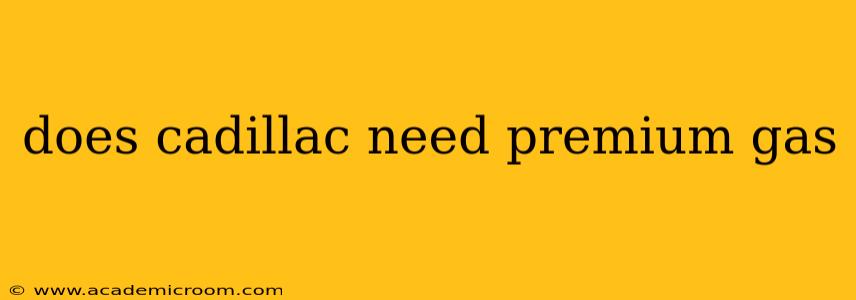The question of whether your Cadillac requires premium gas isn't a simple yes or no. It depends entirely on the specific Cadillac model and year. Many Cadillac engines are designed to run optimally on premium fuel, while others can operate on regular unleaded. Ignoring the fuel recommendations can lead to decreased performance, potential engine damage, and voided warranties. Let's delve into the details to clarify this crucial aspect of Cadillac ownership.
What Happens If I Use Regular Gas in a Cadillac That Needs Premium?
Using regular gas in a Cadillac that requires premium can have several negative consequences. The primary issue stems from the different octane ratings. Premium gasoline has a higher octane rating, meaning it's less prone to pre-ignition (knocking or pinging). Pre-ignition occurs when the air-fuel mixture ignites prematurely, before the spark plug fires. This can cause:
- Reduced Engine Performance: You'll likely notice a decrease in horsepower and torque. Acceleration will feel sluggish, and the overall driving experience will be less enjoyable.
- Potential Engine Damage: Repeated pre-ignition can cause significant damage to engine components, including pistons, connecting rods, and even the cylinder head. These repairs can be extremely costly.
- Check Engine Light: Your car's onboard diagnostic system (OBD-II) will likely detect the problem and illuminate the check engine light, prompting a visit to the mechanic.
- Voiding the Warranty: Using the wrong type of fuel can potentially void your vehicle's warranty, leaving you responsible for expensive repairs.
Can I Use Premium Gas in a Cadillac That Only Needs Regular?
While using premium gas in a Cadillac designed for regular unleaded won't cause immediate damage, it's generally unnecessary and wasteful. Higher-octane fuel is more expensive, and you won't see any performance gains. Your engine is calibrated for regular fuel, and using premium won't provide any added benefit.
How Do I Know What Kind of Gas My Cadillac Needs?
The most reliable way to determine the recommended fuel type for your Cadillac is to:
- Check Your Owner's Manual: This is the definitive source. The manual will clearly state the recommended octane rating for your specific model and year.
- Look at the Fuel Filler Door: The recommended fuel type is often indicated on a sticker located inside the fuel filler door.
- Consult Your Dealership: If you're still unsure, contact your local Cadillac dealership. They can provide specific information about your vehicle's fuel requirements.
What is Octane Rating?
Octane rating is a measure of a gasoline's resistance to knocking or pinging during combustion. A higher octane rating indicates greater resistance to pre-ignition. Premium gasoline typically has an octane rating of 91 or higher, while regular gasoline is usually around 87.
What are the long-term effects of using the wrong fuel?
Consistent use of the incorrect fuel grade can lead to significant long-term damage to your engine. The cumulative effect of pre-ignition can result in costly repairs down the line and significantly shorten the lifespan of your engine. It is always best to stick with the manufacturer's recommendations.
My Cadillac is recommending premium gas, but can I use mid-grade instead?
While some drivers might consider using mid-grade gasoline (typically around 89 octane) as a compromise, it’s generally not recommended. Your engine is designed for either premium or regular, and using mid-grade may not fully prevent pre-ignition, negating the intended benefits. Sticking with the recommended premium fuel offers the best protection for your engine's long-term health and performance.
By carefully following the fuel recommendations in your owner's manual and understanding the implications of using the wrong type of fuel, you can ensure your Cadillac performs at its best and maintains its value for years to come. Remember, prevention is always cheaper than cure when it comes to engine maintenance.
